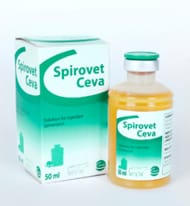
Spiramycin Solution for injection
PROPERTIES
Spiramycin is an antibiotic of the macrolides group. It is bacteriostatic and can be bactericidal at high concentrations. Macrolides inhibit protein synthesis by binding to the 50S ribosomal sub-units of bacterial ribosomes and preventing peptide formation. Moreover,
spiramycin inhibits the adhesion of the bacteria to the epithelial cells (particularly for gram positive cocci like Staphylococcus and Streptococcus) and stimulates the phagocytosis capacity of the polynuclear neutrophils. Spiramycin has post-antibiotic effects.
Spiramycin has some antimicrobial activity against Gram-positive bacteria and mycoplasmas, as well as certain Gram-negative germs, particularly Legionella and Actinobacillus. The spectrum of activity of spiramycin includes Staphylococcus sp., Streptococcus sp.,
Enterococcus, Streptococcus pneumoniae, Neisseria intracellularis, Listeria monocytogenes, Corynebacterium diphteriae, Mycoplasma sp., Clostridium sp., Bacteroides sp., Haemophilus sp., Treponema pallidum, Treponema microdentium, Leptospira ictero-hemorragiae,
Toxoplasma, Miyagawanella, Brucella, Pasteurella, Rickettsia sp. and Amoeba sp. Spiramycin is widely distributed into tissues and secretions, in particular genital tissues, respiratory system and milk. It presents good intracellular penetration. The spiramycin half life is very
long: 20.9 hours after intramuscular injection. It is extensively metabolised through the biliary system, which contributes to its enteric effect. Spiramycin toxicity is very low.

 Corporate Website
Corporate Website
 Africa
Africa
 Argentina
Argentina
 Asia
Asia
 Australia
Australia
 Belgium
Belgium
 Brazil
Brazil
 Bulgaria
Bulgaria
 Canada (EN)
Canada (EN)
 Chile
Chile
 China
China
 Colombia
Colombia
 Denmark
Denmark
 Egypt
Egypt
 France
France
 Germany
Germany
 Greece
Greece
 Hungary
Hungary
 Indonesia
Indonesia
 Italia
Italia
 India
India
 Japan
Japan
 Korea
Korea
 Malaysia
Malaysia
 Mexico
Mexico
 Middle East
Middle East
 Netherlands
Netherlands
 Peru
Peru
 Philippines
Philippines
 Poland
Poland
 Portugal
Portugal
 Romania
Romania
 Russia
Russia
 South Africa
South Africa
 Spain
Spain
 Sweden
Sweden
 Thailand
Thailand
 Tunisia
Tunisia
 Turkey
Turkey
 Ukraine
Ukraine
 United Kingdom
United Kingdom
 USA
USA
 Vietnam
Vietnam
